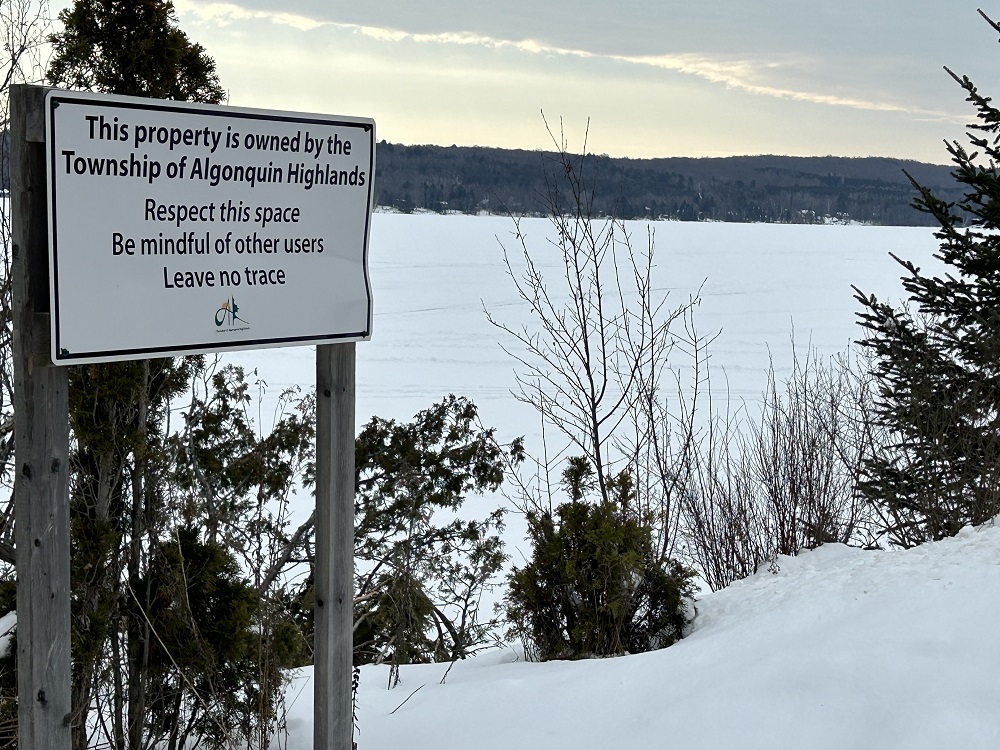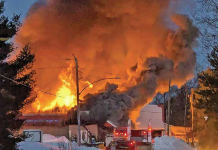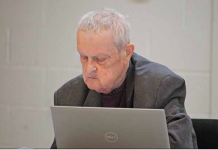Algonquin Highlands mayor Liz Danielsen said the township is “trying to do the right thing” after becoming embroiled in a disagreement with property owners along North Shore Road over an access point to Maple Lake.
The municipality issued a press release Feb. 1 stating the land, located near the intersection of North Shore and Dawson roads, has been used by the public for decades to access the water.
Danielsen said this was in response to a group of homeowners who have made repeated claims the property is privately owned, noting frequent attempts have been made to prevent people from using the spot to access the lake.
“To be abundantly clear, the property in question is municipally owned… no claims of private ownership have been substantiated through any credible documentation or otherwise,” the release states.
Kythe Baldwin, president of the Haliburton County Landowners’ Association, told The Highlander he is one of the property owners taking exception to what he believes is “blatant overreaching” by the township.
“They’re trying to steal people’s property and we’re not going to let that happen… Algonquin Highland thinks they own [that parcel], they think they own North Shore Road – they do own the road, they own the pavement, but they don’t own the land underneath it,” Baldwin claims, citing Crown land patents issued in the late 1800s suggest ownership lies with the individual property owners.
Baldwin says he has a patent for his property, at 1805 North Shore Road, dating back to 1863, which he claims is the oldest known document for land surrounding Maple Lake. He said the land that houses the access point is covered by another Crown patent, held by one of his neighbours, that has been in place since 1883.
“We’ve gone through every historical document for [our properties] and the Crown land patent has never been opened, it’s never been amended, it’s never been changed, it’s never been cancelled,” Baldwin said.
Danielsen is adamant Algonquin Highlands owns the land, noting the township has received confirmation from its legal counsel. Baldwin says he’s not been presented with any physical documentation proving that, despite repeated requests.
“I’ve asked for almost 10 years now – show us what rights you have,” Baldwin said. “The only thing I can rely on is the 1913 act that downloaded shore road allowances from the province to the township. There’s nothing else. If they had anything, they would have had to purchase the property from the family, which there’s no record of, or they would have had to open the Crown land patent, which they haven’t done,” Baldwin said.
Algonquin Highlands planner Sean O’Callaghan did not respond to The Highlander’s request for comment and clarification.
Danielsen said no trespass orders were issued in January, with those cautioned immediately issuing no trespass orders of their own to the township. She noted further action was taken in mid-February, though didn’t elaborate.
The mayor advised anyone trying to use the access point who is “bullied or hassled” to report the issue to the OPP.
“That’s about all we can do right now,” Danielsen said.
Licensing root of issue
Baldwin indicated this issue is far bigger than a disagreement over a single parcel – he’s questioning the legality of the township’s license of occupation policy, which was passed in December.
“When [Maple Lake] was surveyed in 1860, the shore road allowance [they allocated] is now about 120 feet off the shore. It’s buried under water,” he said, believing that, years after the lake was flooded for the Trent Severn Waterway project, the township moved the allowance to the top of North Shore Road.
“Those shorelands, if a patent is held, are private property,” Baldwin added.
Stefanos Karatopis, a governor with the Ontario Landowners Association, says in cases where private property owners hold Crown patents for lands a municipality wants, it would have to be expropriated. He says this is covered in the federal Public Documents Act.
“They’re set in stone, the patents say ‘forever to their heirs’ and forever hasn’t happened yet. There’s no way for those patents to be cancelled, deleted, anything,” he said. “[Algonquin Highlands] would have to come up with documentation showing the municipality owns this land… or they’d have to buy it.”





